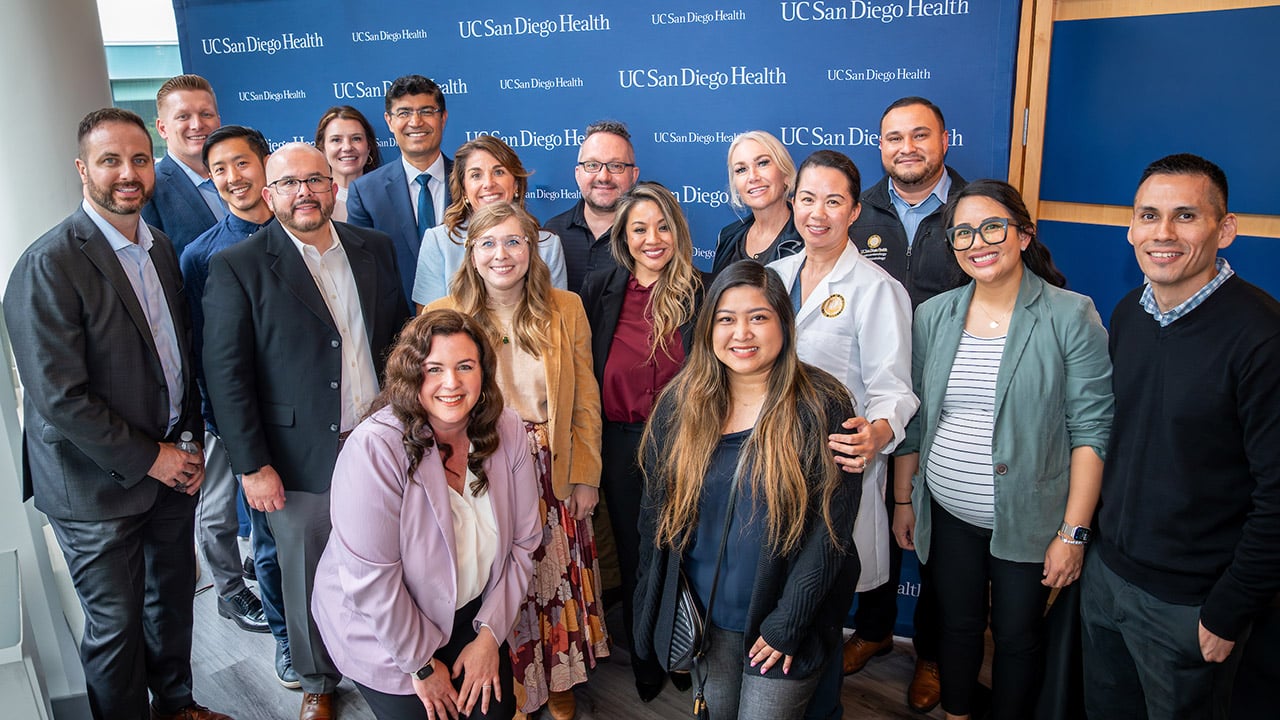IBD Treatment & Surgery
The goal of treatment for inflammatory bowel diseases is to achieve remission so that symptoms disappear and to maintain remission so flare-ups don’t occur, improving quality of life.
Remission leads to healing of the lining of the gastrointestinal tract.
UC San Diego Health is a leader in studying new treatments for ulcerative colitis and Crohn’s disease.
Risks of Not Treating IBD
Active disease symptoms of IBD are challenging to live with. One risk of not treating IBD is a higher frequency of flare-ups (of inflammation and symptoms) and progression of the inflammation to irreversible bowel damage. Left untreated, complications of IBD can include:
- Arthritis
- Skin conditions
- Inflammation of the eyes
- Liver disorders
- Kidney disorders
- Bone loss
- Increased risk of intestinal cancer
- Intestinal strictures causing bowel obstruction
- Intestinal perforation causing fistulas and abscesses
Go to the Experts
While there’s no permanent cure for IBD, we can carefully evaluate and determine the best course of treatment for your IBD.
Treatment options, including medications and surgery, will depend on the symptoms, prognosis and severity of the disease.
Treating IBD with Medications
Several types of drugs are available to treat IBD. First and foremost, treatment must reduce inflammation so symptoms are relieved and nutrients can be absorbed by the intestines.
Treatment is designed to maintain remission and control the chronic inflammation so the disease is manageable and complications are prevented.
Medications include:
- Aminosalicylates, or 5-ASA drugs, are anti-inflammatory medicines that can be taken orally or via suppositories or enemas to suppress inflammation in the intestine and relieve painful symptoms. UC San Diego researchers helped lead clinical trials that resulted in the approval of Asacol HD and Lialda for ulcerative colitis.
- Corticosteroids, such as prednisone, methylprednisone and hydrocortisone are powerful, fast-acting anti-inflammatory drugs. They are used by people who have moderate to severe IBD who do not respond to 5-ASA drugs. Since these drugs trigger side effects, they’re not feasible for long-term maintenance of IBD.
- Antibiotics can be used to reduce and suppress intestinal bacteria, even though there’s no specific infectious agent associated with IBD.
- Immunomodulators help weaken the activity of the immune system, which reduces inflammation. Since they act very slowly, they are often paired with corticosteroids, which act quickly.
- Biologic therapies, a class of medications that includes Remicade, Humira and Cimzia, treat inflammation effectively for many people. These drugs are developed to target specific proteins that cause inflammation and suppress the immune response. UC San Diego researchers helped lead clinical trials that resulted in the approval of Remicade and Humira for ulcerative colitis, and Humira, Cimzia and Tysabri for Crohn's disease.
Investigational Medications for IBD
Our researchers are evaluating a variety of investigational medications for inflammatory bowel disease. These are medications that the FDA has not yet approved for the treatment of ulcerative colitis or Crohn’s disease.
Investigational medications may already be approved by the FDA for the treatment of another disease, but are under investigational use for ulcerative colitis or Crohn’s disease.
Alternatively, investigational medications may have not been approved yet for any disease, but are being studied as potential treatments for ulcerative colitis or Crohn’s disease.
Investigational medications are studied in clinical trials. The information collected is then evaluated by the FDA to determine whether the medication should be approved for the treatment of ulcerative colitis or Crohn’s disease.
Surgery for IBD
Our surgeons are experts in advanced minimally invasive surgical techniques for inflammatory bowel disease (IBD). These minimally invasive procedures mean smaller incisions, less scarring and faster healing.
We incorporate the use of single-incision techniques, robot-assisted and transanal approaches when appropriate to provide the best possible outcomes in the treatment of Crohn’s disease, ulcerative colitis and their complications.
Surgery for Crohn’s Disease
UC San Diego’s advanced surgery for Crohn’s disease includes surgical treatment for:
- Patients with recurrent Crohn’s disease, including reoperations following earlier surgeries
- Patients who have been treated with combination immunosuppressant therapies
- Patients at higher risk for repeat relapses, such as those who smoke
- Patients experiencing urgent complications, including intestinal perforation, bowel obstruction or severe bleeding
- Patients with esophageal Crohn’s disease and stomach or duodenal Crohn’s disease
According to the National Institute of Digestive and Kidney Diseases, approximately two-thirds of people with Crohn’s disease will require surgery at some point in their lives. Crohn’s disease can occur anywhere along the digestive tract, from the mouth to the anus.
Our colorectal surgeons perform intestinal sparing surgical procedures including proctocolectomy, ileostomy, temporary ostomy, intestinal resection, strictureplasty, minimally invasive correction of anal abscesses and fistulas, and incision draining with seton placement for managing infection.
Surgery for Ulcerative Colitis
While Crohn’s disease can involve any part of the digestive tract, ulcerative colitis is generally limited to the lining of the large intestine (colon). Surgery is the best treatment option, if:
- Medications do not effectively reduce symptoms
- The medications or ulcerative colitis cause life-threatening side effects
- Inflammation has been present for many years and pre-cancer (dysplasia) or colon cancer is developing
A proctocolectomy (removal of the rectum and colon) is curative for UC because without a colon or rectum, you cannot have UC. Of course, this is a life-altering surgery. After a proctocolectomy, surgeons recreate a reservoir to store body wastes.
Our surgeons have unmatched experience in ileoanal reservoir (J-pouch) surgery and the surgical management of complications related to J-pouch creation. In addition, we are the leading medical center in the region for urgent surgery for toxic ulcerative colitis.
Surgery has often been considered a last resort for IBD, but for many people, especially those with UC, surgery gives them their lives back.
IBD Experts
Comprehensive, innovative care that meets your individual needs.


